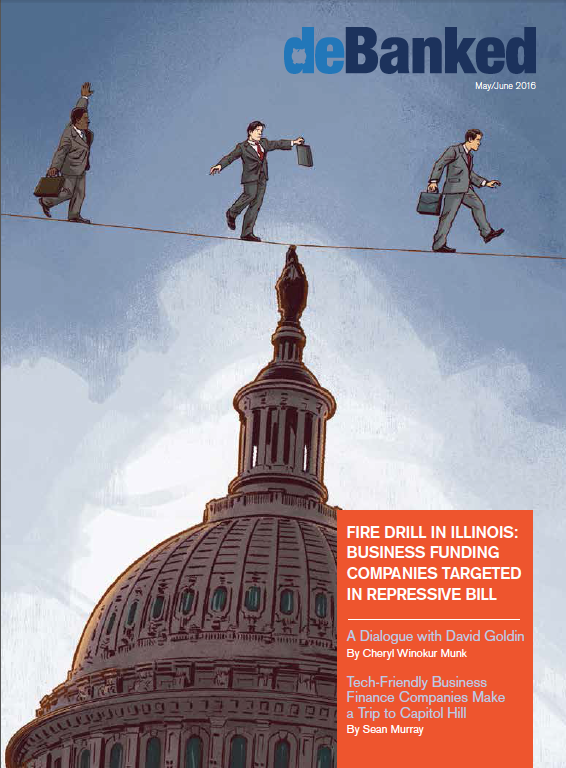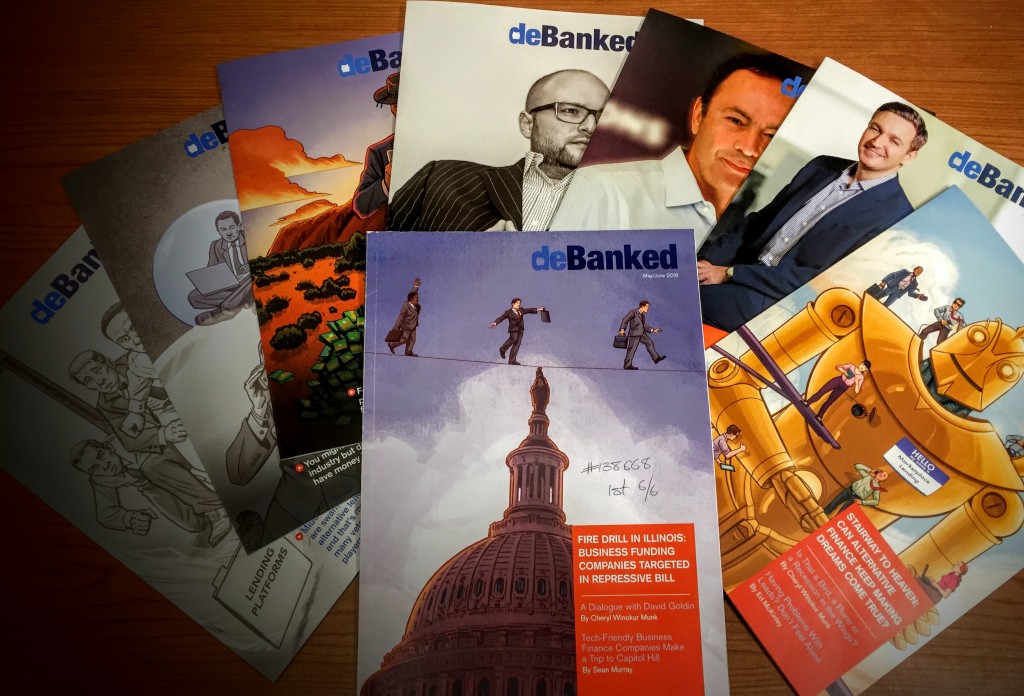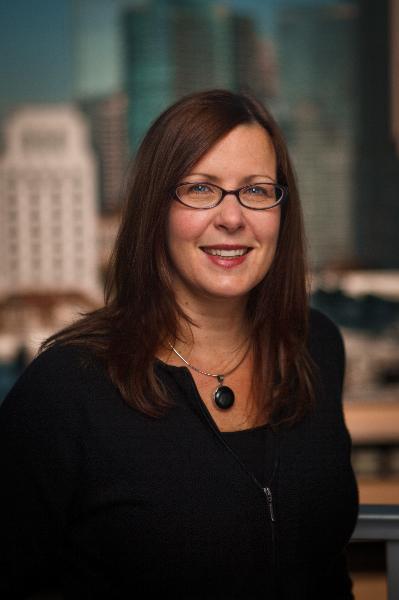Marketplace Lending
Kabbage Boosts Platform Biz, Partners with Canadian Bank Nova Scotia
June 22, 2016Online lender Kabbage loans has partnered with Canada’s third-largest bank, Bank of Nova Scotia to offer online loans to small businesses.
Small businesses in Canada can apply for loans online and get a decision quickly. The program will be extended to businesses in Mexico later this year. Customers will have the flexibility to draw the funds as individual term loans, from as little as $1,000 in Canada and each loan can have its own repayment terms.
In an interview with deBanked earlier this month, Kabbage co-founder Kathryn Petralia said that the company wants to grow its platform business with such partnerships. In April this year, Spanish bank Banco Santander said that it will use Kabbage’s technology to underwrite loans up to £100,000 the same day for loans that typically take 2-12 weeks to process.
Santander, Nova Scotia and ING together invested $135 million in Kabbage’s series E funding.
BRIEF: OnDeck Expands in Denver, Invests $5 million in Office Space
June 16, 2016
OnDeck is expanding its Denver hub.
The online lender inaugurated a new office space worth $5 million, that can accommodate 550 people as it plans to add more to its existing staff there of 170. This is OnDeck’s second biggest hub after New York where it employs 300 people.
The state of Colorado and the Denver Office of Economic Development each gave the company $500,000 in 2012. And in August 2015, OnDeck won an additional $10.4 million in job growth incentive tax credits for creating an additional 400 jobs.
“Our goal is to steadily grow the office and invest more in Denver,” said Noah Breslow, the company’s CEO was quoted as saying in the Denver Post. “Denver is a natural fit for OnDeck.”
States like Colorado and New Jersey are wooing new fintech companies to build and expand their bases in the region. Thanks to the Grow New Jersey Assistance Program, merchant cash advance companies including World Business Lenders and Yellowstone Capital relocated from New York City over across the Hudson to Jersey City in exchange for tax credits. Yellowstone, for instance will earn $3.3 million over ten years in tax credits.
As Its Peer Winds Down, Able Lending Commits $5 million to Dallas Companies
June 13, 2016Small business lender Able Lending will pump in $5 million to fund companies in the Dallas-Forth Worth area in the wake of its peer running out of business.
Able calls itself “lowest cost non-bank lender” to small businesses and lends up to $1 million to businesses at any stage. Able offers better rates to entrepreneurs who raise funds from Backers – or family, friends and “fans” who fund as much as 10 percent of most Able loans. The company claims that its borrowers save $31,000 on loans between $25,000 and $1 million.
“DFW is an important market for Able. Our $5 million-dollar commitment to DFW solidifies that Able is ready to fund more deserving small businesses,” said Evan Baehr, president and cofounder of Able which began in Dallas last year to fund nearly $2 million to companies in the area.
Last week (June 5th), personal lender Vouch Financial which follows a similar family-and-friend strategy announced that it was shutting down. The three year old firm based out of San Francisco made personal loans based on what it called a ‘vouching network’ or sponsors, which secures the loan.
The Wall Street Journal reported that Vouch’s investors decided to stop backing the firm as demand for loans retreated as it struggled to compete with bigger rivals.
‘We Cannot Have Opaque Black Boxes Running Our Economy,’ Says Director of US PIRG
June 9, 2016
During a marketplace lending event hosted by the FTC, one panelist said he was not impressed by the reliance that some consumer lenders have on proprietary algorithms and secret sauces to determine who gets approved for a loan. Ed Mierzwinski, Consumer Program Director for U.S. PIRG, a nonprofit consumer interest group, expressed that regulators should investigate these methodologies. “We cannot have opaque black boxes running our economy,” he said. “That may be something that excites the investors” but credit fairness has to come first, he added.
Meanwhile, Jessica Milano, a Deputy Assistant Secretary for the U.S. Treasury, explained that underwriting methodologies used by consumer marketplace lenders still produce results that are highly correlated with FICO. The Treasury published a much-talked-about report on marketplace lending just last month.
Peter Renton, who founded the LendAcademy blog and LendIt conference, countered Mierzwinski by explaining that alternative data sources are not so much about assessing credit-worthiness, but rather about verifying the identity of the applicant.
Milano and Renton both conceded that things were different on the business lending side of the industry.
This was an educational event, not an inquiry or hearing so nobody was officially being scrutinized. FTC Commissioner Edith Ramirez said in her introductory speech that “most observers agree that, given the advantages it offers both lenders and borrowers, marketplace lending is here to stay.”
You can watch a recap of the 3-hour event below. It starts at about 1 hour in to the recording.
Community Banks Worried That Marketplace Lenders Have Regulatory Advantage
June 8, 2016 Community banks have been slow to adopt services offered by marketplace lenders “out of fear of undue scrutiny by their prudential bank regulators,” wrote the Independent Community Bankers of America (ICBA) in a letter to the OCC last week. The banks would or could be more proactive in offering small loans in rapid fashion, if the regulators give “community banks the flexibility to lead the path,” they said.
Community banks have been slow to adopt services offered by marketplace lenders “out of fear of undue scrutiny by their prudential bank regulators,” wrote the Independent Community Bankers of America (ICBA) in a letter to the OCC last week. The banks would or could be more proactive in offering small loans in rapid fashion, if the regulators give “community banks the flexibility to lead the path,” they said.
One issue they raised was the consideration of a limited purpose federal bank charter, which, if implemented, would reduce the need for marketplace lenders to partner with chartered banks or eliminate the need for marketplace lenders to subject themselves to the maze of 50-state compliance. The ICBA, according to the letter, is all for this since it would subject marketplace lenders to federal oversight, but they fear it would not go far enough to truly level the playing field.
“For instance, if such a charter did not have authority to take deposits, the charter may be subject only to a compliance supervision and examination. ICBA believes that the recent problems that some of the online marketplace lenders have experienced with liquidity and earnings, as well as with compliance, makes it important that these lenders be subject to safety and soundness supervision and regulation.”
Their fear is that a limited charter would give marketplace lenders all the benefits but with less oversight than them, and that’s not fair. Not mentioned however is that marketplace lenders are for the most part regulated, albeit not in the exact same manner as banks. Another of the ICBA’s stated concerns is that marketplace lenders are exempt from safety and soundness oversight and thus their stability and liquidity is not being monitored.
“These companies have not experienced a serious economic downturn yet and already they have been subject to serious funding and capital issues,” they wrote.
While true, consumer deposits are not at risk since they don’t take them. And given the industry’s size at present, the potential danger to the economy should one or some fail, is relatively minor.
Shanda Group Now Owns 15% of Lending Club
June 8, 2016 It’s time for that update in the Lending Club saga.
It’s time for that update in the Lending Club saga.
After exiled CEO Renaud Laplanche sold 1.2 million shares worth $5.3 million, in the company he founded, Chinese billionaire Tianqiao Chen raised his stake in the company to 15 percent from 11 percent.
Chen’s company Shanda Group had upped its stake to 11 percent last month, making it the lender’s largest shareholder without an active management role.
Last week (June 8th) Renaud Laplanche was said to be in talks with banks and hedge funds to take the company private while the beleaguered lender was in negotiations with three hedge funds – Och-Ziff Capital Management, Soros Fund Management and Third Point to fund potentially $5 billion in loans and earn rights to own equity.
Prior to that, the San Francisco-based company had postponed its annual shareholder meeting from June 7th to June 28th and raised interest rates by 55 basis points while reducing the debt to income criteria by 12 percent.
“Given the developments of the last few weeks, the company is not yet in a position to provide its stockholders a complete report on the state of the company,” the company wrote in a SEC filing.
Below is a timeline of what 2016 has been like for Lending Club.
May
On May 9th, CEO Renaud Laplanche resigned after the board found that the company had sold an investor loans worth $22 million which violated terms given by the investor.
Three days later, on May 12th, a consortium of 200 community bank suspended their purchases of Lending Club loans.
On May 17th, Lending Club was subpoenaed by the Justice Department.
On May 23rd, the company revealed that a group led by Chinese billionaire Chen Tianqiao had upped its stake in Lending Club to 11.7%, giving it significant influence in the company.
On May 24th, the US Solicitor General published a legal brief that argued that the US Court of Appeals for the Second Circuit erred in its ruling on Madden v Midland, reducing the odds that the US Supreme Court will hear the case, and diminishing the potential negative impact that the ruling could have on Lending Club’s business model.
On May 25th, the WSJ reported that a fund Lending Club controls had strayed from its intended parameters and bought riskier loans than it had intended.
April
Ironically, in April, Lending Club along with Funding Circle and Prosper had joined forces to create a collaborative non-profit body, i.e. a trade association to promote transparency in lending.
In a SEC filing on Thursday (April 21), Lending Club notified the bureau that it will increase interest rates by 23 basis points in grades D-G and also updated its loss projections.
Later that month, the firm was in talks with Goldman Sachs and Jefferies Group to put together its first big bond offering backed by unsecured loans.
March
Lending Club filed its revised Loan Receivables and Sale Agreement and Marketing Agreement with WebBank as part of its 8-K filing on March 2nd. This revision was made to give WebBank more of a stake in the risk of each loan.
On March 8th, in an interview with Bloomberg, Renaud Laplanche said that he sees no credit deterioration and justified the rate hikes done in February as a means to cover losses should the economy slow down.
On March 22nd, the lender said that it was shifting its focus back to retail investors and invest in technology to serve them better, going back to its marketplace roots and reducing its dependence on Wall Street hedge funds and banks.
February
In February, perhaps taking cues from the Madden vs Midland case, Lending Club announced that it had changed its fee model with WebBank and also raised rates it charged to borrowers.
Completing a year since IPO, the company swung to a profit of $4.6 million, its second quarterly profit.
Earlier in February, JP Morgan acquired Lending Club loans worth $1 billion for a premium, in which borrowers had a 700 FICO score on average. This was a month after Santander sold Lending Club loans worth $1 billion in January.
Are You Ready to deBank Again?
June 8, 2016As the newest issue of deBanked magazine prints, the question remains, are you subscribed to receive it?
The May/June issue delves deeper into the legislative events taking place in Illinois, a summary of industry trips to Washington DC, an interview with Capify’s David Goldin, a recap of LendIt and more.
Subscriptions are FREE and yes, it’s a physical publication.


Transparent Pricing Creates a Level Playing Field, says Kabbage’s Kathryn Petralia
June 7, 2016 Loan matchmaking site Lending Tree has joined the Innovative Lending Platform Association (ILPA) to participate in developing a universal small business lending disclosure system to raise transparency with lenders. It will work closely with the association over a 90-day “national engagement period” to create and implement the SMART Box (Straightforward Metrics Around Rate and Total Cost).
Loan matchmaking site Lending Tree has joined the Innovative Lending Platform Association (ILPA) to participate in developing a universal small business lending disclosure system to raise transparency with lenders. It will work closely with the association over a 90-day “national engagement period” to create and implement the SMART Box (Straightforward Metrics Around Rate and Total Cost).
deBanked spoke to Kathryn Petralia, cofounder of Kabbage Loans, which is spearheading the association with OnDeck and CAN Capital. Below are the edited excerpts from the interview:
Tell us about how the ILPA came about?
We (OnDeck, CAN Capital and Kabbage) represent the largest non bank lenders. We have collectively lent $12 billion through the course of our businesses and so we thought it will be great for us to make a statement through ILPA. We came from a perspective that there are a lot of different products for small businesses on the market like merchant cash advance, equipment financing, invoice factoring and lines of credit. All of these serve different needs and are ambiguously priced. So we wanted to find some methodology which is transparent to borrowers so they can know the exact price and total cost of borrowing.
We want to keep it open and hope that everyone participates in the disclosure methodology so borrowers can have a clear understanding of the fees they are paying.
What is SMART Box. How does it work?
Different loan products have different fees — some have maintenance fees, some have broker fees, usage fees and so on and they are all structured very differently. It can get very confusing and so we came up with all the products to understand what disclosures would be necessary to know the total cost of borrowing. We’re working with OnDeck and CAN Capital to gather comments and disclose a series of methodologies that will create the ‘Straightforward Metrics Around Rate’ and Total Cost or SMART Box. Those who want to participate will have to disclose it on loan agreements to their customers.
What about disclosures by companies? Would you say the industry needs more regulation on that front?
Kabbage and other companies in the industry are all regulated and go through FDIC audits. We all follow KYC, CIP, FFIEC guidelines that refer to lenders. We all follow these regulations and I would argue vociferously that we are regulated businesses already. All companies are very different and there are a bunch of things happening — states like California, Illinois and New York and CFPB are all taking interest in small business lending and it’s a positive that they recognize the partnership between banks and tech companies. On the general lending side, we have Dodd-Frank and Madden vs Midland which look at lending issues. Some of the regulation is around how loans are sold and some of it is around how they are limited. And on the small business lending side, there is push for more transparency which is the reason we launched ILPA. We wanted to set the standard for what that would look like. And having it done comprehensively is beneficial for us as it gives us a level playing field.
On the consumer lending side, there is transparency but it’s still lacking a comprehensive system that encapsulates the total cost of borrowing. APR is a great metric but the total cost of borrowing must be included.
Give us a snapshot of what the industry looks like to you
All businesses serve different markets, are different in the way they fund their loans and operate in different geographies, so it’s hard to say but in general those who have done a good job at incorporating data and tech and streamlined operative process will have an advantage and will make it through economic turbulence.
What’s your short-term prediction?
Companies that are not well capitalized will have a tough time raising capital in 2016 and we have already been approached by a number of businesses that are looking to sell or find a partnership because they aren’t well capitalized.
Tell us what’s happening at Kabbage?
We have two businesses – the direct lending business which we are trying to grow and the second is the platform business where we have seen sustained growth, with existing partnerships with ING in Europe, Santander in the UK and Scotia Bank in Canada. More partnerships are in the offing – both domestically and in Latin America.





























